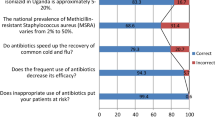Abstract
Background
Antimicrobial resistance (AMR), globally and nationally, is considered as a serious problem. We aimed to assess the knowledge, attitudes, and practices of physicians towards antimicrobial resistance.
Aim of the work
To assess the knowledge, attitudes, and practices of physicians towards antimicrobial resistance in Egypt.
Study design
A cross-sectional study.
Methods
The study was conducted on a group of physicians from various specialties prescribing antibiotics in different hospitals in Fayoum Governorate from January to December 2017. Data was collected using self-administered questionnaires covering four main areas (demographic characteristics, knowledge, attitudes, and practices). Knowledge score was calculated for 11 knowledge questions by giving one point for each correct answer with maximum score 11. Attitude score was calculated for 21 attitude questions by giving 2 for agree, 1 for neutral and 0 for disagree, with maximum score 42.
Results
Mean knowledge score of 302 participants was 8.65 ± 1.69 out of 11. The main knowledge score was significantly higher among physicians working at Fayoum University Hospital (FUH) than at other hospital types, among pediatricians and physicians of internal medicine specialists than surgeons & obstetricians, and among participants reporting internet as a source of knowledge (P < 0.05). Mean total attitude score was 36.4 ± 4.47. Attitude score was significantly higher among physicians working at insurance hospital, followed by those working at FUH, and physicians reporting internet as a source of knowledge (P < 0.05). Positive correlation between knowledge and attitude scores was reported (r = 0.313, P = 0.001). About 33.8% declared that they prescribe antibiotics for viral infections. With regard to factors affecting antibiotic prescribing, the most commonly reported were previous experience (85.4%), antibiotic availability (68.2), guidelines (70.2%), and microbiological advice (55.6%).
Conclusion
Despite good knowledge and appropriate attitudes of our participants, the practices of participants need to be improved.

Similar content being viewed by others
References
Dooling KL, Kandeel A, Hicks L, El-Shoubary W, Fawzi K, Kandee Y, Etman A, Lohiniva L, Talaa M (2014) Understanding antibiotic use in Minya District, Egypt: physician and pharmacist prescribing and the factors influencing their practices. Antibiotics (Basel) 3(2):233–243. https://doi.org/10.3390/antibiotics3020233
García C, Llamocca LP, García K, Jiménez A, Samalvides F, Gotuzzo E, Jacobs J (2011) Knowledge, attitudes and practice survey about antimicrobial resistance and prescribing among physicians in a hospital setting in Lima, Peru. BMC Clin Pharmacol 11:18. https://doi.org/10.1186/1472-6904-11-18
Genga EK, Achieng L, Njiri F, Ezzi M (2017) Knowledge, attitudes, and practice survey about antimicrobial resistance and prescribing among physicians in a hospital setting in Nairobi, Kenya. Afr J Respir Med 12(2)
Habibzadeh F (2013) Use and misuse of antibiotics in the Middle East. Lancet 382:1–2. http://download.thelancet.com/flatcontentassets/middle-east/Nov13_MiddleEastEd.pdf
Om C, Vlieghe E, McLaughlin JC, Daily F, McLaws ML (2016) Antibiotic prescribing practices: a national survey of Cambodian physicians. Am J Infect Control 44(10):1144–1148. https://doi.org/10.1016/j.ajic.2016.03.062
Pulcini C, Williams F, Molinari N, Davey P, Nathwani D (2011) Junior doctors’ knowledge and perceptions of antibiotic resistance and prescribing: a survey in France and Scotland. Clin Microbiol Infect 17:80–87. https://doi.org/10.1111/j.1469-0691.2010.03179.x
Remesh A, Gayathri AM, Singh R, Retnavally KG (2013) The knowledge, attitude and the perception of prescribers on the rational use of antibiotics and the need for an antibiotic policy-a cross sectional survey in a tertiary care hospital. J Clin Diagn Res 7:675–679. https://doi.org/10.7860/JCDR/2013/5413.2879
Ryu S, Kim BI, Lim JS, Tan CS, Chun BC (2017) One health perspectives on emerging public health threats. J Prev Med Public Health 50(6):411–414. https://doi.org/10.3961/jpmph.17.097
Sabry NA, Farid SF, Dawoud DM (2014) Antibiotic dispensing in Egyptian community pharmacies: an observational study. Res Social Adm Pharm 10(1):168–184. https://doi.org/10.1016/j.sapharm.2013.03.004
Saied T, Elkholy A, Hafez SF, Basim H, Wasfy MO, El-Shoubary W, Samir A, Pimentel G, Talaat M (2011) Antimicrobial resistance in pathogens causing nosocomial bloodstream infections in university hospitals in Egypt. Am J Infect Control 39:61–65. https://doi.org/10.1016/j.ajic.2011.04.009
Scicluna EA, Borg MA, Gür D, Rasslan O, Taher I, Redjeb SB, Elnassar Z, Bagatzouni DP, Daoud Z (2009) Self-medication with antibiotics in the ambulatory care setting within the Euro-Mediterranean region; results from the ARMed project. J Infect Public Health 2:189–197. https://doi.org/10.1016/j.jiph.2009.09.004
Srinivasan A, Song X, Richards A, Sinkowitz-Cochran R, Cardo D, Rand C (2004) A survey of knowledge, attitudes, and beliefs of house staff physicians from various specialties concerning antimicrobial use and resistance. Arch Intern Med 164:1451–1456. https://doi.org/10.1001/archinte.164.13.1451
Thriemer K, Katuala Y, Batoko B, Alworonga JP, Devlieger H, Van Geet C, Ngbonda D, Jacobs J (2013) Antibiotic prescribing in DR Congo: a knowledge, attitude and practice survey among medical doctors and students. PLoS One 8(2):e55495. https://doi.org/10.1371/journal.pone.0055495
Ventola CL (2015) The antibiotic resistance crisis: part 1: causes and threats. P T 40(4):277–283
Wester CW, Durairaj L, Evans AT, Schwartz DN, Husain S, Martinez E (2002) Antibiotic resistance: a survey of physician perceptions. Arch Intern Med 162(19):2210–2216. https://doi.org/10.1001/archinte.162.19.2210
WHO (2014) Antimicrobial resistance: global report on surveillance. World Health Organization, Geneva. Available at http://www.who.int/drugresistance/documents/surveillancereport/en/. Accessed Sept 2017
WHO (2015) Worldwide country situation analysis: response to antimicrobial resistance. World Health Organization, Geneva. Available from: http://www.ac2bmr.fr/images/WHO_Response.pdf. Accessed Dec 2017
WHO (2016) Antimicrobial resistance: a growing threat in the EMR. Eastern Mediterranean Regional Office (EMRO). Epidemiological Monitor 9:21. Available at http://applications.emro.who.int/dsaf/epi/2016/Epi_Monitor_2016_9_21.pdf?ua=1. Accessed Nov 2017
Acknowledgements
The authors would like to thank all physicians who participated in the study, and the directors of their hospitals.
Author information
Authors and Affiliations
Corresponding author
Ethics declarations
Conflict of interest
The authors have declared no conflict of interest.
Ethical approval
All procedures performed in studies involving human participants were in accordance with the ethical standards of the institutional and/or national research committee and with the 1964 Helsinki Declaration and its later amendments or comparable ethical standards.
Additional information
Publisher’s note
Springer Nature remains neutral with regard to jurisdictional claims in published maps and institutional affiliations.
Rights and permissions
About this article
Cite this article
Abdel Wahed, W.Y., Ahmed, E.I., Hassan, S.K. et al. Physicians’ knowledge, attitudes, and practice concerning antimicrobial resistance & prescribing: a survey in Fayoum Governorate, Egypt. J Public Health (Berl.) 28, 429–436 (2020). https://doi.org/10.1007/s10389-019-01027-x
Received:
Accepted:
Published:
Issue Date:
DOI: https://doi.org/10.1007/s10389-019-01027-x




